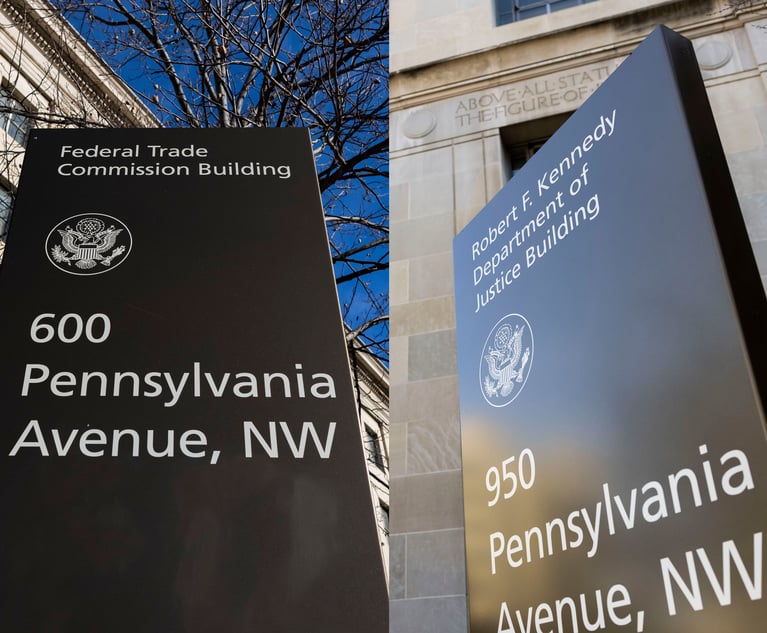E-discovery Technology Trends
Companies must choose between software licensing, best of breed, outsourcing and the single solution for their e-discovery needs.
May 18, 2011 at 08:00 PM
5 minute read
The original version of this story was published on Law.com
Companies have been struggling for years now with whether to go with a single vendor offering a single solution that spans the entire EDRM e-discovery lifecycle, to pick and choose best of breed technology or to simply outsource the work.
The reason for choosing a single solution from collection through review are compelling: It's easier to track the ESI from collection through review, there's consistency in process and reporting, efficient customer support, less training and it can be easier to defend the process. On the other hand, there are just as valid reasons why best of breed is the way to go: It offers flexibility, avoids weak links in the technology, offers better customization and adaptability, etc.
Additionally, there is the debate about whether a company should bring e-discovery in house or outsource the process. I am a firm believer that preservation and collection should be brought in-house. However, the decision to bring processing and production in-house is a more difficult one. Outsourcing processing, review and production, in many cases, is definitely a better approach.
I see the current state of e-discovery technology as being extremely fluid and moving quickly as the amount of ESI grows and the laws evolve. Investing in an entire e-discovery infrastructure may not be a prudent decision these days. Outsourcing is becoming more attractive as prices come down. It allows a company to have both best of breed and a single vendor for consistency; since most service providers don't use a single technology, but have many in their tool box.
This need for flexibility in a rapidly evolving market is forcing vendors to be more creative in how they license technology. Term licenses in the form of an annual subscription is now in vogue, as wells as vendors providing a variety of licensing options to meet the customers specific needs. I am seeing the perpetual software license agreement losing favor because it requires more of a commitment from the customer and puts them in a technology straight jacket.
All of these factors complicate the decision making process. It is clear there is no easy answer as the technology evolves in this rapidly changing market. It really depends on the company, its current technology infrastructure and the litigation load. Utilizing a neutral third party expert consultant is critical to making the right decisions.
Companies have been struggling for years now with whether to go with a single vendor offering a single solution that spans the entire EDRM e-discovery lifecycle, to pick and choose best of breed technology or to simply outsource the work.
The reason for choosing a single solution from collection through review are compelling: It's easier to track the ESI from collection through review, there's consistency in process and reporting, efficient customer support, less training and it can be easier to defend the process. On the other hand, there are just as valid reasons why best of breed is the way to go: It offers flexibility, avoids weak links in the technology, offers better customization and adaptability, etc.
Additionally, there is the debate about whether a company should bring e-discovery in house or outsource the process. I am a firm believer that preservation and collection should be brought in-house. However, the decision to bring processing and production in-house is a more difficult one. Outsourcing processing, review and production, in many cases, is definitely a better approach.
I see the current state of e-discovery technology as being extremely fluid and moving quickly as the amount of ESI grows and the laws evolve. Investing in an entire e-discovery infrastructure may not be a prudent decision these days. Outsourcing is becoming more attractive as prices come down. It allows a company to have both best of breed and a single vendor for consistency; since most service providers don't use a single technology, but have many in their tool box.
This need for flexibility in a rapidly evolving market is forcing vendors to be more creative in how they license technology. Term licenses in the form of an annual subscription is now in vogue, as wells as vendors providing a variety of licensing options to meet the customers specific needs. I am seeing the perpetual software license agreement losing favor because it requires more of a commitment from the customer and puts them in a technology straight jacket.
All of these factors complicate the decision making process. It is clear there is no easy answer as the technology evolves in this rapidly changing market. It really depends on the company, its current technology infrastructure and the litigation load. Utilizing a neutral third party expert consultant is critical to making the right decisions.
This content has been archived. It is available through our partners, LexisNexis® and Bloomberg Law.
To view this content, please continue to their sites.
Not a Lexis Subscriber?
Subscribe Now
Not a Bloomberg Law Subscriber?
Subscribe Now
NOT FOR REPRINT
© 2024 ALM Global, LLC, All Rights Reserved. Request academic re-use from www.copyright.com. All other uses, submit a request to [email protected]. For more information visit Asset & Logo Licensing.
You Might Like
View All
SoundCloud GC Takes Legal Reins of Condé Nast at Tumultuous Time

Senate Panel Postpones Vote on Reconfirmation of Democrat Crenshaw to SEC

As AI-Generated Fraud Rises, Financial Companies Face a Long Cybersecurity Battle

FTC, DOJ Withdrawal of Antitrust Guidelines for Collaboration Infuriates Republicans
5 minute readTrending Stories
- 1City Bar Presents Thomas E. Dewey Awards to Outstanding NYC Prosecutors
- 2NC Solicitor General Park Withdraws His 4th Circuit Nomination
- 3Trump-Appointed Judge Presides Over NASCAR Antitrust Dispute Under Case Reassignment
- 4CFPB Orders Big Banks to Limit Overdraft Fees to $5. But Will Its Edict Stick?
- 5FIFA Faces Legal Challenge Over Winning Saudi World Cup Bid
Who Got The Work
Michael G. Bongiorno, Andrew Scott Dulberg and Elizabeth E. Driscoll from Wilmer Cutler Pickering Hale and Dorr have stepped in to represent Symbotic Inc., an A.I.-enabled technology platform that focuses on increasing supply chain efficiency, and other defendants in a pending shareholder derivative lawsuit. The case, filed Oct. 2 in Massachusetts District Court by the Brown Law Firm on behalf of Stephen Austen, accuses certain officers and directors of misleading investors in regard to Symbotic's potential for margin growth by failing to disclose that the company was not equipped to timely deploy its systems or manage expenses through project delays. The case, assigned to U.S. District Judge Nathaniel M. Gorton, is 1:24-cv-12522, Austen v. Cohen et al.
Who Got The Work
Edmund Polubinski and Marie Killmond of Davis Polk & Wardwell have entered appearances for data platform software development company MongoDB and other defendants in a pending shareholder derivative lawsuit. The action, filed Oct. 7 in New York Southern District Court by the Brown Law Firm, accuses the company's directors and/or officers of falsely expressing confidence in the company’s restructuring of its sales incentive plan and downplaying the severity of decreases in its upfront commitments. The case is 1:24-cv-07594, Roy v. Ittycheria et al.
Who Got The Work
Amy O. Bruchs and Kurt F. Ellison of Michael Best & Friedrich have entered appearances for Epic Systems Corp. in a pending employment discrimination lawsuit. The suit was filed Sept. 7 in Wisconsin Western District Court by Levine Eisberner LLC and Siri & Glimstad on behalf of a project manager who claims that he was wrongfully terminated after applying for a religious exemption to the defendant's COVID-19 vaccine mandate. The case, assigned to U.S. Magistrate Judge Anita Marie Boor, is 3:24-cv-00630, Secker, Nathan v. Epic Systems Corporation.
Who Got The Work
David X. Sullivan, Thomas J. Finn and Gregory A. Hall from McCarter & English have entered appearances for Sunrun Installation Services in a pending civil rights lawsuit. The complaint was filed Sept. 4 in Connecticut District Court by attorney Robert M. Berke on behalf of former employee George Edward Steins, who was arrested and charged with employing an unregistered home improvement salesperson. The complaint alleges that had Sunrun informed the Connecticut Department of Consumer Protection that the plaintiff's employment had ended in 2017 and that he no longer held Sunrun's home improvement contractor license, he would not have been hit with charges, which were dismissed in May 2024. The case, assigned to U.S. District Judge Jeffrey A. Meyer, is 3:24-cv-01423, Steins v. Sunrun, Inc. et al.
Who Got The Work
Greenberg Traurig shareholder Joshua L. Raskin has entered an appearance for boohoo.com UK Ltd. in a pending patent infringement lawsuit. The suit, filed Sept. 3 in Texas Eastern District Court by Rozier Hardt McDonough on behalf of Alto Dynamics, asserts five patents related to an online shopping platform. The case, assigned to U.S. District Judge Rodney Gilstrap, is 2:24-cv-00719, Alto Dynamics, LLC v. boohoo.com UK Limited.
Featured Firms
Law Offices of Gary Martin Hays & Associates, P.C.
(470) 294-1674
Law Offices of Mark E. Salomone
(857) 444-6468
Smith & Hassler
(713) 739-1250






